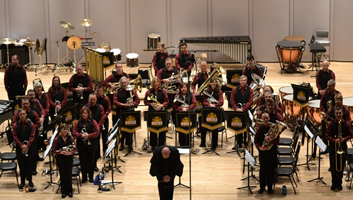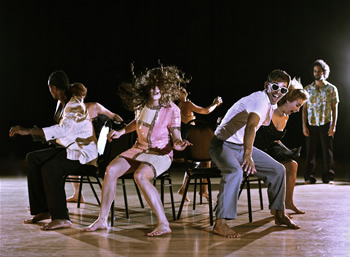It is said that perfection is not of this world, and many, from pundits to politicians, are here to prove the point. But when the only blemish in a complex concert is a slightly flat top to a final chord, one has the feeling of having experienced perfection! From the burnished richness of the brass in the Humperdinck to the eerie ponticello in the Finale of the Bartók, the flawless execution of the scores gave proof not only of the stellar quality of the artist musicians but also of the character and cohesiveness of the ensemble, fostered by the personality and musicianship of its leader, Gerard Schwarz.
Opening the Eastern Music Festival Orchestra concert with his own 25-minute suite of the highlights of Engelbert Humperdinck’s popular opera, Hänsel und Gretel, Maestro Schwarz adroitly balanced the rather thick orchestration to effectively reveal the romantic counterpoint, particularly in the opening Prelude and in the final Dream-Pantomime. Some highlights of this performance were the perfectly balanced horns and bassoons in the familiar opening evening prayer, the lovely cello cadenza of Neal Cary and the simplicity of the woodwinds in the light-hearted children’s theme at the end of the Witch’s Ride.
Samuel Barber (1910-81) is one of the best known American composers, and enjoyed that distinction from his mid-twenties when the legendary Arturo Toscanini conducted the premiere of his Adagio for strings. An accomplished singer and virtuoso pianist, Barber’s works often demonstrate a gift for lyricism, as evident in the first two movements of his Concerto for Violin, Op. 14. Soloist Elmar Oliveira was in his element in this concerto; with a warm tone and impeccable intonation, he endeared the concerto to the audience. The third movement makes an abrupt break from the soaring lyricism of the first two movements – an irritant to some prospective performers since its creation at the start of World War II. It is short, breathtakingly fast (Presto in moto perpetua), and difficult to play, both for soloist and for orchestra. Maestro Schwarz used efficient minimalist gestures to keep everything together while Oliveira astounded us with the rush of quick scales and arpeggios. The audience was instantly on its feet in admiration.
Béla Bartók (1881-1945) and his wife Ditta Pásztory escaped WWII in the United States, but Bartók had no source of income until Serge Koussevitzky, Music Director of the Boston Symphony Orchestra, commissioned a work for that ensemble. The resultant Concerto for Orchestra, premiered in 1944 and one of the musical monuments of the 20th Century, is certainly Bartok’s most played work. And this was a performance to die for – from the opening fourths, rising from oblivion, to the piercing lament of the high strings in the tortured middle movement (Elegia) and the massive short brass chorale which heralds the final coda, this was superlative playing. This Eastern Music Festival Orchestra is superb – from Washington to Atlanta to St. Louis, there is no orchestra that can match it – don’t miss it!
The EMF continues through July 26. For details, see our calendar.












